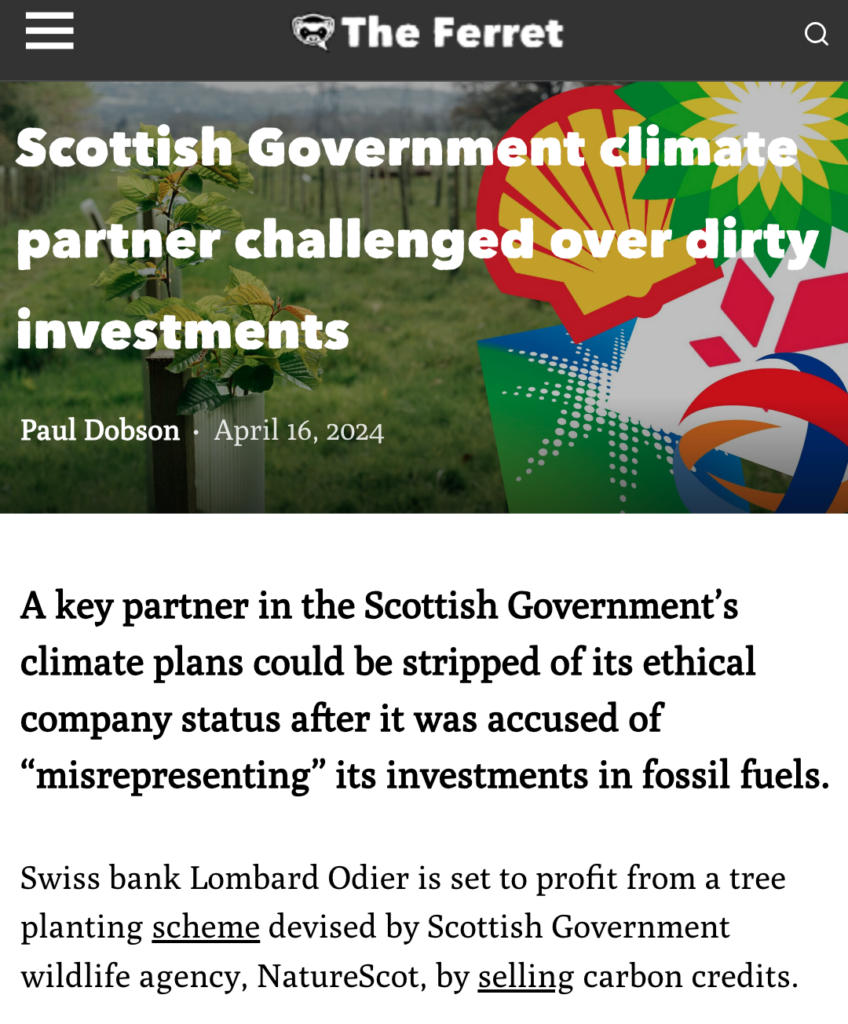Eko and the Toxic Bonds Network filed a formal complaint requesting B Corp investigate Lombard Odier’s climate-destructive investments and revoke Lombard Odier’s certification unless they immediately commit to divest and deny new debt from companies deriving more than 10% of their revenue from coal, oil and gas. This includes all Adani entities, including Adani Green, due to interrelated party transactions and lack of ring fencing.
Lombard Odier is investing billions of dollars in the form of bonds and shares in fossil fuel companies that are continuing to expand their operations. Although the company claims that it incorporates sustainability principles and a brand new approach to responsible investing so that it can avoid greenwashing and disappointing its investors, the company’s involvement in responsible investing has been marred by accusations of greenwashing.
Lombard Odier investment in an exploratory oil drilling project located in a diversity hotspot off the coast of the Bahamas sparked condemnation and controversy because it was feared that any oil spill from the project could destroy nearby marine parks, coral reefs and oceans ecosystems. Local groups also felt that such a project and associated oil spills would be disastrous for the country’s tourism, which employs nearly 50% of the Bahamas workforce. Lombard Odier had to hastily withdraw from the project.
More recently, its involvement in a pilot scheme of woodland restoration in Scotland has also been criticised as greenwashing. The scheme plans to create 185,000 hectares of native woodland and absorb 28m tonnes of carbon dioxide over the next 30 years. Lombard Odier’s role is to sell carbon credits accrued from the pilot scheme to companies in the UK looking to offset their carbon emissions. But critics have pointed out that such schemes have been misused before by big polluters to show green credentials. Weapons manufacturers, oil companies like Shell and financial institutions have been buying lightly regulated Scottish carbon credits without transitioning their carbon intensive practices or reducing their emissions.
B Corporations are supposed to be businesses that meet high standards of verified social and environmental performance, public transparency and legal accountability to balance profit and purpose. They are legally required to consider the impact of their decisions on their workers, customers, suppliers, community and the environment. Lombard Odier has not been transparent about its investments in fossil fuel companies, and continues to contribute to run-away climate change through its irresponsible investments.
Lombard Odier states in the Sustainable Policy section on its website that “it is our conviction that sustainable investing is the way to generate long-term returns and grow our clients’ prosperity in perpetuity.” While Lombard Odier has an ESG policy, it does not apply its ESG principles vigorously for onboarding of clients with the exception of certain prohibited industries. Contrary to its sustainable claims, Lombard Odier holds shares and bonds in many coal, oil and gas companies, including four of the most climate-polluting companies in the world: Saudi Aramco, ExxonMobil, Shell and BP.
It is also a shareholder in the following fossil fuel companies which derive more than 10% of their revenue from fossil fuel extraction and expansion.
- Glencore: 93598104 GBp
- TotalEnergies: 13,839,581 Euro
- Shell: 7,673,833,965 GBp
- Ithaca Energy: 53,669,000 GBp
- British Petroleum: 10,100,000,000 GBp
- Exxon Mobil: 19,181,360 USD
- Equinor: 4,699,431 NOK
- Suncor: 1,093,232 CAD
An analysis of its investment funds by The Ferret has revealed that 23 of its funds are invested in fossil fuel companies, with one having around 17% of its investments in fossil fuels and another fund investing in more than fifty separate fossil fuel firms. Lombard Odier’s investment funds with net zero targets have been found to have holdings in BP, Shell and Equinor, the company planning to exploit the controversial Rosebank Field in the North Sea.
Based on data pulled from Bloomberg and Refinitiv in Fall 2023, Lombard Odier holds over US $80 million in bonds of Global Coal Exit List companies (coalexit.org) and US $548 million in bonds of Global Oil and Gas Exit List (gogel.org). This number is likely a vast underestimate given there is limited visibility of bondholder data and Lombard Odier does not make their investments publicly available.
Adani Group
An example of Lombard Odier’s particularly egregious investments includes bonds in the world’s biggest private developer of new coal – the Adani Group. Lombard Odier’s bond holdings in Adani Group companies total over US $141 million. Lombard Odier’s investment in any arm of the Adani Group is violating its own – as well as B Corp’s – investment restriction policy of not investing in companies that derive more than 10% of their revenue from coal. AGEL’s renewables pipeline is dwarfed by the wider Group’s coal expansion and any debt raised for AGEL frees up capital for the Group’s coal businesses. Despite this, Lombard Odier invested in Adani Green’s ‘green bond’ which was Adani’s first USD bond offering since Hindenburg.
